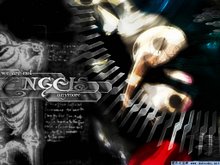It is not often that a movie is such a crowd-pleaser that the audience responds with tumultuous applause not once but numerous times. That is the kind of reaction Denzel Washington’s The Great Debaters inspired when I saw it in a crowded theater. Yes, the movie follows some tried and true underdog movie conventions but rarely is it done so skillfully that it does not wait until the final deciding match to provide small moral triumphs along the way to have people stand up and cheer.
Denzel Washington’s The Great Debaters is, in many ways, the “sports movie” I have been waiting to see. Based on a true story about an all-African American debate team that hopes to win the national debate championship in the Great Depression after facing off against other African-American as well as Caucasian debate teams across the country, it is a movie that has the heroes fighting their personal and ethical struggles with words, not physicality. Melvin Tolson (Denzel Washington), the professor who forms that debate team in an all-African American college, Wiley College, sets the grounds and says, “Debate is like blood sport. Blood sport is combat and the weapons are words.”
His standards are unbending and his expectations demanding and after a night of tryouts, he picks four members. The mainline debaters are Henry Lowe (Nate Parker), an astute, intellectual student who is also a bit of a womanizer and a hard-drinker, and Hamilton Burgess (Jermaine Williams), and the two alternates, Samantha Booke (Jurnee Smollett), who is reportedly the first female college debater in history, and 14-year old James Farmer Jr. (Denzel Whitaker), the researcher for the team. The latter in particular, despite being the youngest, also carries a certain amount of reputation because he is the son of James Farmer Sr. (Forest Whitaker), a preacher who is one of the few African-Americans so far to graduate from Harvard University.
The debate team’s singular struggle to win the championship title would be enough to fuel a worthy, inspirational story but Washington’s film paints a richer canvas that does not escape the harsh issues of racism in the Jim Crow South of the 1930s. There are some harsh emotional moments that drive the prejudice home such as a significant one when the team is driving home one night and sees a black man strung up on a cross after being burned to death by a lynching mob. Tolson, as many people know today, is also one of American’s most renowned poets (a fact that is only slightly hinted at) and it turns out that he has a secret life as an organizer for a national sharecropper’s union between blacks and whites, which anger the racist local sheriff, Dozier (John Heard) and may set yet another obstacle for the team.
The relationships between the members of the debate team are not simplistic either as a seemingly clichéd plot of a young James looking jealously at the potential blossoming romance between Henry and Samantha does not resolve itself in necessarily predictable ways. Tolson also carries the flaw of insisting on writing the arguments himself for the debate team instead of letting the team have their own voice, which Henry’s equally headstrong personality often collides with. There is also James’ relationship with his parents, which becomes more strained after he witnesses Tolson’s secret life.
Washington as director and writers Robert Eisele and Jeffrey Porro pull all of these strands together into a story that teaches that the journey to win should really be the means to the end of educating oneself and others to think morally and without racial prejudice or discrimination. The dialogue, which needs to be eloquent in a movie about debates, is contributive to many of the film’s well-timed and paced triumphant emotional moments within the Wiley team’s arguments that challenge for the resolutions of issues we now take for granted such as racial integration in colleges (though there could have been a more unpredictable, dimensional challenge if they had to argue for something they don’t believe in, as real debaters sometimes have to do). The debating atmosphere is also enriched in the conversations within the team as everyone seems to be talking in the cultural code of argument and rhetoric throughout (as when Tolson explains the origin of the word, lynching to the team).
Washington is one of the most magnetic and likable actors on the screen, which is why we always welcome him playing another flawed but decent, authoritative figure, no matter how many times he has played other such roles from Courage Under Fire to Remember the Titans. He also shows more definitive proof after Antwone Fisher to be a true actor’s director, as he gives every one of his actors to define who they are and not single his own character to necessarily be the natural “hero” of the story. The familial issues that result within Denzel Whitaker’s character find their own uneasy complexity, which culminate in a long-awaited square off between Washington and Forest Whitaker who conflict in the social issues around them despite both having the best interests for the young teenager (the fact that the child actor’s name happens to be Denzel Whitaker is not intentional, as he is neither related to Forest Whitaker nor named after Washington).
By the end of the film, I found myself caring so much about these vivid characters in this time and place that I actually would have found the story equally satisfying and uplifting whether the team won or not. Of course, most stories about underdogs are told because they satiate our natural desires for the longshots to triumph but the great ones make you feel that you care for them as individuals more than the outcome. Seeing these people have the will to challenge the harsh times they lived in was enough to make me cheer for their moral victory, before their historically important, visible one.
Subscribe to:
Post Comments (Atom)


No comments:
Post a Comment